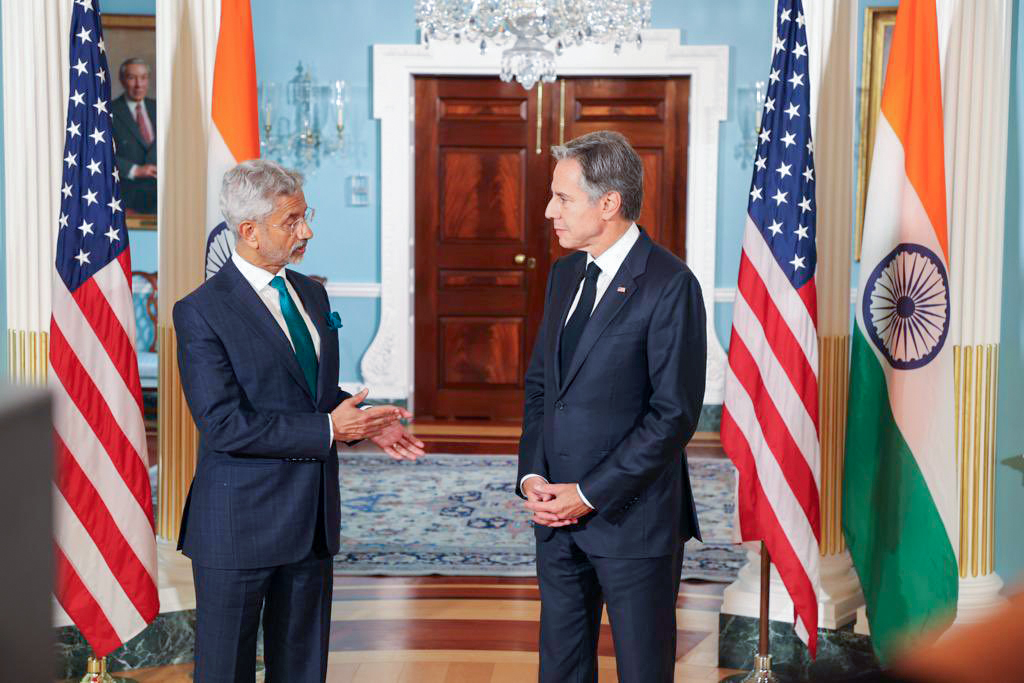New Delhi
In a setback to Canadian Prime Minister Justin Trudeau, the United States is unwilling to continue to wade into the ongoing diplomatic row between India and Canada. Washington also shares New Delhi’s concerns about “the Indian diplomatic mission working amidst a climate of violence and an atmosphere of intimidation” in Canada. “After External Affairs Minister (EAM) S. Jaishankar’s meeting with US Secretary of State Antony Blinken and NSA Jake Sullivan in Washington, the Biden administration is ‘convinced’ that Ottawa could not share any credible evidence with New Delhi to substantiate Trudeau’s claims of India’s hand in the killing of Khalistani terrorist Harjit Singh Nijjar,” a diplomatic source told The Sunday Guardian.
“In fact, Jaishankar, during the talks explained India’s position on developments in Canada quite convincingly and logically based on facts and figures. As a result, Blinken and the US NSA emerged from the meeting fully satisfied,” a source privy to the meetings in Washington told this newspaper. The tone and tenor of Blinken’s statement was completely changed even as he came out of the meeting. Talking to reporters, Blinken said, “The Canada row was discussed during a meeting with EAM Jaishankar. Those responsible need to be held accountable, and we hope that our friends in both Canada and India will work together to resolve this matter.” Notably, Blinken refrained from reiterating that “India should cooperate with the Canadian investigation”. This is the statement that Blinken has been making ever since the India-Canada diplomatic row erupted.
Significantly, just minutes ahead of Jaishankar’s meeting with Blinken and Sullivan in Washington DC, State Department spokesperson Matthew Miller had told journalists, “We continue to encourage them (India) to cooperate with the Canadian investigation.” He was hinting at Blinken ready to reiterate this advice. Officials in New Delhi interpret Blinken’s statement as an indication of change of US approach towards the whole issue. “Signal is clear that Blinken has left the matter to be resolved between India and Canada. He did not go beyond saying this. He did not say a word that could be perceived as his intention to intervene in the matter,” officials here said, adding, “earlier the Secretary of State had been encouraging the Indian government to cooperate in an investigation into the murder of a Sikh terrorist on Canadian soil.”
During the meeting with Jaishankar, Blinken also readily agreed to convene the India-US 2+2 ministerial dialogues in New Delhi in November. “Although no dates have been announced yet, it is expected that the Indian foreign and defence ministers will hold the dialogue with their US counterparts, under the 2+2 format, in the first half of November,” a source said. “Blinken’s approval for this meeting is a positive sign that the Biden administration is putting primacy on US-India bilateral relationships amid the Canada row. That the Canada row will not cast its shadow on ties between New Delhi and Washington is the message here,” said officials here.
Nothing could explain the outcome of EAM’s meeting with Blinken better than the words of Jaishankar himself, “The Canada row came up in talks with Blinken. He gave America’s views and assessment and I explained at length to them our concerns and our position. Hopefully we both came out better informed.” This statement shows that EAM Jaishankar was satisfied with the meeting.
“Today, I’m actually in a situation where my diplomats are unsafe going to the embassy, or to the consulate. They are publicly intimidated. And that has actually compelled me to temporarily suspend even visa operations in Canada. So as I said, often countries look very different depending on how you see them and what your interests are, but I have this problem in Canada. And so the question ‘Did I speak about it with Jake Sullivan and Tony Blinken, yes I did’.”
Rejecting Canada’s allegations as “absurd” and “motivated”, EAM Jaishankar told Blinken that Canada had failed to provide anything specific and relevant so as to establish whatever allegations came from Prime Minister Trudeau, sources said. Significantly in what is being seen as India’s diplomatic triumph, the India-Canada standoff over Nijjar’s killing was not mentioned in the US State Department’s readout of the talks between Jaishankar and Blinken.
According to sources, Jaishankar was quite candid in explaining India’s view points on the Canada row. In no uncertain terms, the EAM conveyed India’s concerns about Canada “giving space to extremism, terror, trafficking and crime, and a toxic combination of issues and people it has permitted due to its domestic politics”.
According to diplomatic officials, the outcome of the meeting between
Sources told The Sunday Guardian that Jaishankar conveyed a clear message to the American side that Canada serves as ground zero for Khalistani militancy. Blinken was told that Canada was still empty handed in terms of evidence to back up the serious charges that Trudeau made against India. “The American side was told that with the US sharing a long border with Canada which has become a safe haven for Khalistani terrorists and other militant groups, the Biden administration must remain cautious as it might affect the country as well,” a source said.
The US officials were reminded of India-US counter terrorism joint working group’s commitment to combating terrorist proxies, cross-border terrorism and all forms of international terrorism. The joint statement of the India-US working group has in all its meetings called on all countries to take immediate and irreversible action to ensure that no territory under their control is used for terrorist attacks. India and the US have always pledged to ramp up cooperation at multilateral fora such as the UN, GCTF, FATF and Quad. Sources said that the Indian diplomats in Washington told their counterparts that the US should respect the commitments made in the joint statement like this.

